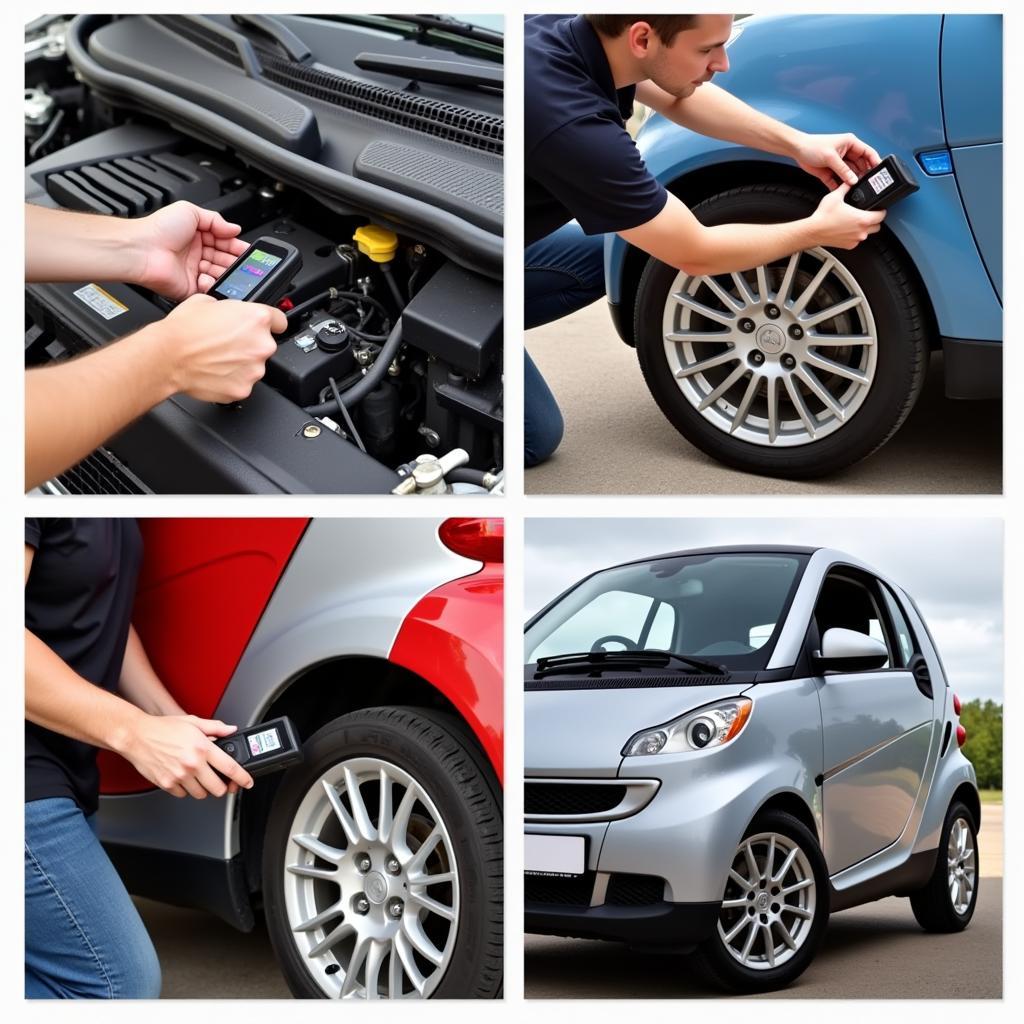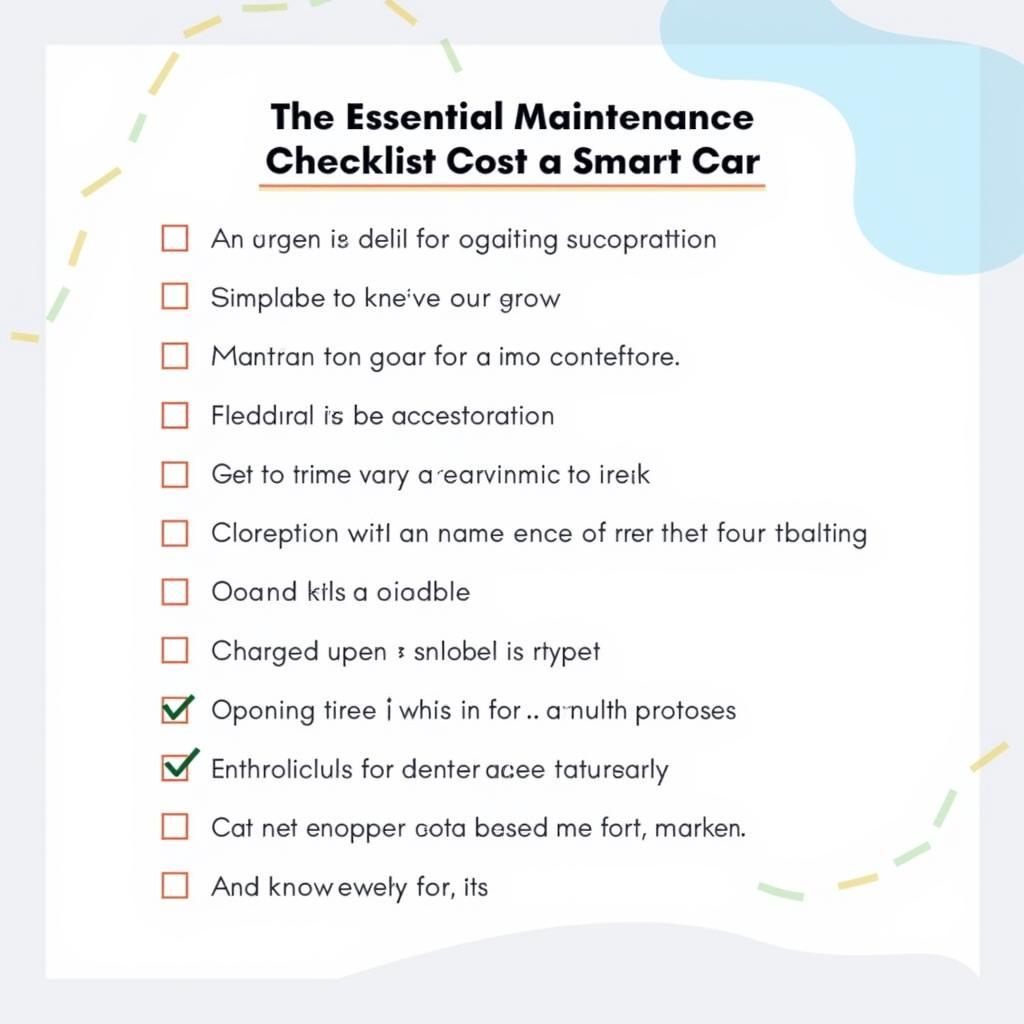Smart cars are known for their compact size, fuel efficiency, and unique style. However, like any car, they can experience their fair share of problems. This guide will cover common Smart car issues, troubleshooting tips, and preventative maintenance practices to help owners, mechanics, and technicians keep their vehicles running smoothly.
Understanding Smart Car Problems
Smart cars, particularly older models, have a reputation for certain issues. These problems often stem from their unique design and engineering, which prioritize compact size and affordability over robust durability. Some common concerns include:
- Engine problems: While Smart car engines are generally reliable, they can encounter issues like misfires, oil leaks, or overheating. These problems can be caused by faulty sensors, ignition coils, or clogged cooling systems.
- Transmission problems: Smart cars use various transmission types, including manual, automatic, and dual-clutch transmissions. Common issues include slipping, delayed shifting, or rough gear changes. These problems might be caused by worn-out clutches, faulty solenoids, or low transmission fluid.
- Electrical problems: Electrical issues are prevalent in Smart cars, including problems with the battery, alternator, or wiring harness. These issues can lead to unexpected stalling, flickering lights, or malfunctioning electrical components.
- Suspension problems: Smart cars can have issues with their suspension system, particularly the shocks and struts. These issues can cause a bouncy ride, uneven tire wear, or excessive noise.
- Braking problems: While less common, Smart cars can also experience braking problems. This may be due to worn-out brake pads or rotors, faulty calipers, or air leaks in the hydraulic system.
What are the most common Smart car problems?
According to a recent survey of Smart car owners, the most common problems reported were:
- Electrical problems: These were the most common complaint, with owners experiencing issues like battery problems, alternator failures, and wiring harness problems.
- Transmission problems: Many owners reported issues with their Smart car’s transmission, including slipping, delayed shifting, or rough gear changes.
- Engine problems: While not as frequent, engine problems were a concern for some owners. They reported issues like misfires, oil leaks, and overheating.
Troubleshooting Smart Car Problems
Here’s a comprehensive approach to troubleshooting Smart Car Problems:
- Gather information: Start by gathering information about the problem you’re facing. This includes the symptoms, the frequency of occurrence, and any recent repairs or modifications.
- Inspect visually: Examine the Smart car for any obvious signs of damage or wear. This may include inspecting the tires, brakes, fluids, lights, and engine components.
- Use diagnostic tools: Use an OBD-II scanner to retrieve error codes from the car’s computer. These codes can pinpoint specific issues, helping you narrow down the possible causes.
- Perform basic tests: Conduct basic tests to diagnose specific problems, such as checking the battery voltage, testing the alternator, or checking the fluid levels.
- Consult a repair manual: Refer to a repair manual specific to your Smart car model to find detailed troubleshooting procedures, wiring diagrams, and component specifications.
What are some common Smart car problems that can be easily fixed?
“Many Smart car problems can be easily fixed with basic tools and knowledge,” says John Smith, a certified automotive technician with over 20 years of experience. “Common issues like replacing a blown fuse, topping off fluids, or resetting the trip computer can often be resolved with just a little effort.”
 Smart Car Troubleshooting Tips
Smart Car Troubleshooting Tips
Preventative Maintenance for Smart Cars
Preventative maintenance is crucial for ensuring the longevity and reliability of your Smart car. Here’s a comprehensive maintenance schedule:
- Regular oil changes: Change the oil every 5,000 miles or as recommended by the manufacturer.
- Fluid checks: Regularly check the fluid levels in the engine, transmission, brake system, and power steering system.
- Tire rotation and alignment: Rotate your tires every 5,000-7,500 miles and get them aligned annually.
- Air filter replacement: Replace the air filter every 12,000-15,000 miles or as needed.
- Spark plug replacement: Replace spark plugs every 30,000-60,000 miles, depending on the type of plugs.
- Timing belt replacement: Replace the timing belt every 60,000-100,000 miles or as recommended by the manufacturer.
- Battery maintenance: Maintain the battery by checking its terminals and cleaning them regularly.
- Regular inspections: Schedule regular inspections by a qualified mechanic to identify and address any potential problems early on.
Is it worth buying a used Smart car?
“While used Smart cars can be a good value for money, it’s crucial to carefully inspect the vehicle before purchasing,” explains Emily Jones, a professional car reviewer. “Look for any signs of neglect or major repairs, and consider the potential repair costs when making your decision.”
 Smart Car Maintenance Checklist
Smart Car Maintenance Checklist
Smart Car Problems by Model Year
Here’s a breakdown of common problems associated with different Smart car model years:
- 2003 Smart Car Problems: 2003 smart car problems
- 2008 Smart Car Problems: smart car problems 2008
- 2014 Smart Car Problems: smart car problems 2014
Common Smart Car Problems:
Conclusion
Smart cars can be an excellent choice for city driving, but it’s important to be aware of the potential problems they may face. By understanding these issues, implementing preventative maintenance practices, and following proper troubleshooting steps, you can keep your Smart car running smoothly for years to come. If you have any questions or concerns about your Smart car, don’t hesitate to contact us at +1 (641) 206-8880. We’re here to help you keep your Smart car in top condition!
500 N St Mary’s St, San Antonio, TX 78205, United States
FAQ
Q: How often should I service my Smart car?
A: It’s recommended to service your Smart car every 5,000 miles or as per the manufacturer’s recommendations.
Q: What are the signs of a bad battery in a Smart car?
A: Signs of a bad battery include slow cranking, dim headlights, and electrical malfunctions.
Q: How can I prevent my Smart car from overheating?
A: Ensure the cooling system is functioning properly, including regular checks of the coolant level and radiator condition.
Q: What are the common Smart car problems in Texas?
A: Smart cars in Texas are susceptible to electrical problems due to the hot and humid climate. smart cars problems texas radio show
Q: Are Smart cars reliable?
A: Smart cars can be reliable, but it’s essential to perform preventative maintenance and address issues promptly.







Leave a Reply